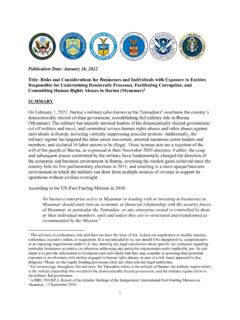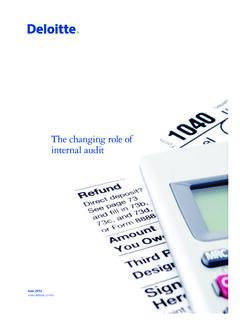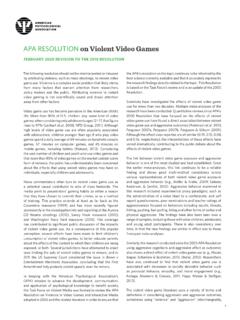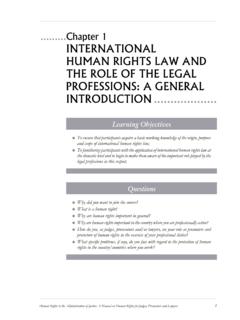Transcription of Governance Code on Public Appointments
1 Governance Code on Public Appointments December 2016. Contents Statutory basis for this Code 1 1. Introduction 2 3. The role of Ministers 3 4. The role of the Commissioner for Public Appointments 5 5. The role of advisory Assessment Panels 5 6. The role of Senior Independent Panel Members 6 7. The role of Departments 7 8. Transparency 8 9. Standards in Public life and handling conflicts 8 10. Pre-appointment Scrutiny 9 Annex 1 Model letter for Senior Independent Panel Members 10 Statutory basis for this Code This Governance Code is published by the Minister for the Cabinet Office in line with the Public Appointments Order in Council 2016.
2 The regulation of Public Appointments against the requirements of this Code is carried out by the Commissioner for Public Appointments . The Commissioner is appointed by the Queen and is independent of the Government and the Civil Service. The Commissioner's functions are set out in the Public Appointments Order in Council 2016. The Order in Council also sets out which Appointments are covered by this Code. 1. Introduction Public appointees play an important role in Public life on the boards of Public bodies and in statutory offices. Public Appointments processes should be designed to ensure that the best people, from the widest possible pool of candidates, are appointed to these roles .
3 This Code sets out the principles that should underpin all Public Appointments , including those Appointments that Ministers have delegated to others. The Commissioner for Public Appointments provides independent assurance that Public Appointments are made in accordance with these principles. This Code will come into effect on a day notified by the Minister for the Cabinet Office to the Privy Council and Commissioner for Public Appointments1. 2. The Principles of Public Appointments The Principles of Public Appointments apply to all those involved with Public Appointments processes.
4 A. Ministerial responsibility - The ultimate responsibility for Appointments and thus the selection of those appointed rests with Ministers who are accountable to Parliament for their decisions and actions. Welsh Ministers are accountable to the National Assembly for Wales. B. Selflessness - Ministers when making Appointments should act solely in terms of the Public interest. C. Integrity - Ministers when making Appointments must avoid placing themselves under any obligation to people or organisations that might try inappropriately to influence them in their work.
5 They should not act or take decisions in order to gain financial or other material benefits for themselves, their family, or their friends. They must declare and resolve any interests and relationships. D. Merit - All Public Appointments should be governed by the principle of appointment on merit. This means providing Ministers with a choice of high quality candidates, drawn from a strong, diverse field, whose skills, experiences and qualities have been judged to meet the needs of the Public body or statutory office in question. E. Openness - Processes for making Public Appointments should be open and transparent.
6 F. Diversity - Public Appointments should reflect the diversity of the society in which we live and Appointments should be made taking account of the need to appoint boards which include a balance of skills and backgrounds. 1 Public appointment competitions which are open and/or have not completed on the day notified should continue to run to completion under the previous Code of Practice published by the Commissioner for Public Appointments . G. Assurance There should be established assurance processes with appropriate checks and balances. The Commissioner for Public Appointments has an important role in providing independent assurance that Public Appointments are made in accordance with these Principles and this Governance Code.
7 H. Fairness Selection processes should be fair, impartial and each candidate must be assessed against the same criteria for the role in question. 3. The role of Ministers Ministers are responsible and accountable to Parliament for Public Appointments . Welsh Ministers are accountable to the National Assembly for Wales. Departmental officials must ensure that Ministers are engaged early on in the planning process for Appointments and that they are involved at every stage of a competition. This means that: Ministers must be consulted before a competition opens to agree the job description for the role, the length of tenure and remuneration.
8 Advice to Ministers must include information on the make-up and diversity of the current board. Any requests to Ministers for reappointments must also include this information and must be submitted early into planning processes. Reappointments should only be made on merit. Ministers should agree how the post will be advertised and the selection process to be used. Assessment and selection processes should be proportionate to the appointment in question and may vary between roles and bodies. Departments must seek Ministerial agreement on the use of recruitment consultants.
9 The Cabinet Office should also be consulted on the use of recruitment consultants2. Departments should provide information on the need and value for money case of using recruitment consultants, which should be by exception, and should consider alternative methods of identifying and attracting a potential pool of candidates. Where recruitment consultants are used, Ministers should be offered the opportunity to meet with them and officials must ensure that the consultants are aware of Ministers' views at all stages of the process. Ministers must agree the composition of advisory Assessment Panels and how they will actively inform Ministers of progress at every stage throughout the competition.
10 Before a competition opens, Ministers and other stakeholders should be asked for names of individuals who should be approached. As a competition closes, Ministers should be consulted on the quality and diversity of the field and whether a competition should be extended. Ministers should also be invited to provide their views to the advisory Assessment Panel on candidates at all stages of a competition. Departments should ensure there is sufficient opportunity for Ministers to engage with the Chair of the board the role is being appointed to. Chairs are well placed to advise on the skills and experience needed to ensure the board, as a whole, is effective 2 This does not apply to Welsh Ministerial Appointments At the end of the process, Ministers should be provided with a choice of appointable candidates.
















